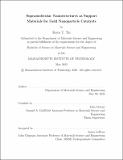Supramolecular Nanostructures as Support Materials for Gold Nanoparticle Catalysts
Author(s)
Tai, Kiera Y.
DownloadThesis PDF (5.957Mb)
Advisor
Ortony, Julia
Terms of use
Metadata
Show full item recordAbstract
The high catalytic activity of gold nanoparticles (AuNPs) has led to their use in a variety of industrially-relevant reactions, such as low-temperature CO-oxidation and selective alcohol oxidation. Most current research focuses on heterogenous gold catalysis, with metal oxides being the most commonly employed support material for AuNPs. However, metal oxides are challenging to evenly distribute in solution and intrinsically difficult to modify. Molecular self-assembly provides a novel route to synthesize AuNP support materials, offering precise control over spatial arrangements and tunable surface chemistries. A particularly promising self-assembled molecule is the aramid amphiphile (AA), which overcomes the typical mechanical fragility of self-assembled structures by incorporating a Kevlar-inspired domain into its molecu- lar structure. In this work, we present a cysteine-functionalized aramid amphiphile platform (CysAA) for AuNP stabilization, which exhibits favorable surface chemical affinity to gold. We show that AuNPs are anchored on the surface of CysAA which can be evenly dispersed in solution, enabling quasi-homogeneous catalysis in aque- ous conditions. Furthermore, the high aspect-ratio of these nanostructures allows for the recovery and recycling of AuNPs from solution by simple filtration. Using the model reduction reaction of 4-nitrophenol, we demonstrate the catalytic activity and recyclability of this AuNP-CysAA catalyst.
Date issued
2022-05Department
Massachusetts Institute of Technology. Department of Materials Science and EngineeringPublisher
Massachusetts Institute of Technology